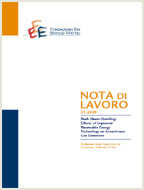Ambiguous Aggregation of Expert Opinions: The Case of Optimal R&D Investment

05.01.2012
Stergios Athanassoglou, Valentina Bosetti, Gauthier de Maere d'Aertrycke
C61, D81, Q42
Aggregation, Ambiguity, R&D, Expert Opinions, Convex/Conic Optimization
Climate Change and Sustainable Development
Carlo Carraro
How should a decision-maker allocate R&D funds when a group of experts provides divergent estimates on a technology's potential effectiveness? To address this question, we propose a simple decision-theoretic framework that takes into account ambiguity over the aggregation of expert opinion and a decision-maker's attitude towards it. In line with the paper's focus on R&D investment, decision variables in our model may affect experts' subjective probability distributions of the future potential of a technology. Using results from convex optimization, we are able to establish a number of analytical results including a closed-form expression of our model's value function, as well as a thorough investigation of its differentiability properties. We apply our framework to original data from a recent expert elicitation survey on solar technology. The analysis suggests that more aggressive investment in solar technology R&D is likely to yield significant dividends even, or rather especially, after taking ambiguous aggregation into account.
***
Suggested citation: Stergios Athanassoglou, Valentina Bosetti, Setting Environmental Policy When Experts Disagree, Environmental and Resource Economics, August 2015, Volume 61, Issue 4, pp 497-516, http://rd.springer.com/article/10.1007%2Fs10640-014-9804-x
